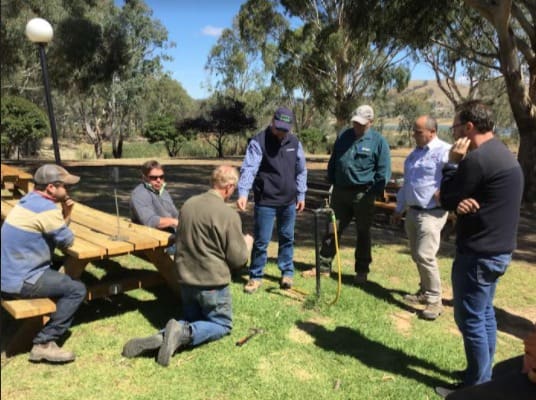
The PDS workshops focused on key sheep management topics like Lifetime Ewe Management, increasing lamb survival and constructing control programs using the FeralScan app. Image – Lucy-Anne Cobby.
A PREDATOR management project on some north-east Victorian sheep farms has provided some easily-applied strategies to lift lamb survival and limit wild dog and fox predation.
Lamb survival rates have increased by up to five per cent among participating sheep flocks using best practice predator management techniques, just eight months into the project.
Eight prime lamb and wool producers in north-east Victoria are taking part in a Meat and Livestock Australia funded Producer Demonstration Site project called ‘Less Predators, More Lambs’.
It is led by Dr Matt Mahoney of Agridome Consultancy and supported by Centre for Invasive Species Solutions’ National Wild Dog Management co-ordinator Greg Mifsud, and Australian Wool Innovation community wild dog control co-ordinator Lucy-Anne Cobby.
The PDS project showcases the implementation of best practice management techniques for the control of wild dogs and foxes on the participating sheep properties. These control practices are incorporated into a Property Specific Pest Management Control Program (PMCP).
The project started in February 2021 and will finish at the end of 2023, but predator management tips able to be used by all farmers are already emerging. Mr Mahoney said use of the free FeralScan app by the cooperating PDS farmers has enabled them to all know immediately where wild dogs and foxes are to co-ordinate control and establish effective bait sites.
The FeralScan app is used by the group to record incidents of livestock attacks, implementation of control and the outcome of control programs. The participating producers then evaluate after the lambing season if changing their predator management practices has an impact on lamb survival rates and if so by how much.
Post-mortems on a sample of dead lambs collected by producers were undertaken by the local veterinarian to determine cause of death. Although only 40 lambs were collected for post-mortem, 18pc were confirmed to have been killed by primary predation with no apparent difference in predation risk as to whether the lamb was a twin or a single. It is hoped by increasing this dataset over the remaining life of the project this information can be further substantiated.
“So if a lamb was born a twin it didn’t mean that it was more likely to be predated upon and so the significance of that is that some of our scanned single flocks came in with no losses, where as the one that we were finding were dying were due to mismothering or exposure.”
This indicated that producers shouldn’t target all of their predator control at their twinning mobs, but also at scanned single flocks, “because if their lambs are going to die of anything it is going to be a predator.”
In its first year, the project had included three training workshops involving the core producers directly involved in the project and interested community members.
The workshops focused on key sheep management topics and included refresher days on Lifetime Ewe Management, increasing lamb survival and constructing PCMPs using the FeralScan app.
There was also training and accreditation on 1080 baiting. Expert speakers on each topic were involved with running each workshop, including Department Environment Land, Water and Planning Senior Local Wild Dog Controller David Klippel on proven techniques for laying 1080 baits, and setting Canid Pest Ejectors and traps.
The producers also formed their own FeralScan app group whereby they could record and view their control and damage activities occurring on their properties for both wild dogs and foxes.
This readily available free app allowed the group to create a map of where they were focusing their control activities, keep records of where they laid baits or traps and helped the group to remain connected and work with their neighbours to coordinate control to get the best outcomes.
Support also included on farm guidance from Greg Mifsud to formulate their PCMPs and use the FeralScan app. This was important to ensure each property could focus control efforts where foxes and wild dogs were mostly likely to be found.
The producers recently met to evaluate their progress so far. All the core producers involved had submitted data on lamb survival rates for the lambing season just gone for their lambing ewes monitored under their property specific PCMPs.
This was compared to previous lambing season data from each property. The results from the first year showed total lamb survival had improved on all the participating properties from 2-5 percent.
With more than 6000 ewes scanned to either single or twins being monitored as part of the project, the increase in lamb survival could potentially add significant dollars to the producer’s bottom line.
The producers reported they were happy with the ease of the FeralScan app use.
“The fact any employees can log into the account and see what was happening on the farm in terms of wild dog and fox activity was also considered to be a great advantage to using the app,” Mr Mifsud said.
“The community group notification process embedded in the app was also seen as a great function of the FeralScan app.
“The app provides a notification to all the group members when one makes a report of a stock attack,” he said.
“Not only does it notify the producer group members, but it also alerts the local wild dog management controller when a wild dog sighting or attack occurred.
“The immediate notification of the wild dog controller was seen as a key function as it had dramatically reduced the response time to incident of the wild dog attack within the group.”
The group will continue to monitor, evaluate and report their progress of the project until its completion in 2023.
For further information on FeralScan visit www.feralscan.org.au

HAVE YOUR SAY